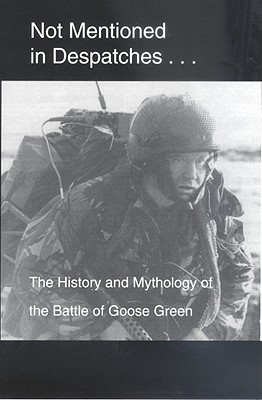Not Mentioned in Despatches. . .: The History and Mythology of the Battle of Goose Green

Not Mentioned in Despatches. . .: The History and Mythology of the Battle of Goose Green
Although much has been written about the battle of Goose Green during the Falklands War, never before have its events been dissected so thoroughly and objectively, nor illuminated so clearly in the terms of current debate in NATO armies on tactical command systems as in this book. The British success at Goose Green was described by the then-Chief of the General Staff as a feat of arms and gallantry probably unsurpassed in the glorious history of the British army; how true a picture is given by such descriptions, both official and unofficial? Using factual analysis and in-depth interviews with participants, the author demonstrates that the battle in fact highlighted serious flaws in the British armyis command culture. His knowledge of recent attempts to reform the army's command system, and of the ongoing tactics debate, allows Fitz-Gibbon to elucidate the two basic models of command system identifiable in the Falklands war. Restrictive control, traditionally preferred in the British army and still the accepted doctrine in 1982, holds that military action can be planned in detail in advance and expected to run according to plan as long as subordinates merely obey their orders. Directive command, on the contrary, recognises that the chaos of battle cannot be controlled without overwhelming material superiority, and therefore seeks to establish a more flexible system within the framework of an overall plan. Applying this distinction to Goose Green, Fitz-Gibbon shows that the British achieved much greater success when departing from the army's usual methodology - after the death of H Jones - than when adhering to the practices taught at officer training establishments. The worrying conclusion drawn from this assessment is that inaccurate reporting, and the unquestioning glorification of its performance, have hindered the army's efforts at modernising its command system, with serious consequences in past wars, and for future conflicts. This very readable book offers fascinating insights into how history is written and how armies often fail to learn from their experiences.
PRP: 302.10 Lei
Acesta este Prețul Recomandat de Producător. Prețul de vânzare al produsului este afișat mai jos.
241.68Lei
241.68Lei
302.10 LeiIndisponibil
Descrierea produsului
Although much has been written about the battle of Goose Green during the Falklands War, never before have its events been dissected so thoroughly and objectively, nor illuminated so clearly in the terms of current debate in NATO armies on tactical command systems as in this book. The British success at Goose Green was described by the then-Chief of the General Staff as a feat of arms and gallantry probably unsurpassed in the glorious history of the British army; how true a picture is given by such descriptions, both official and unofficial? Using factual analysis and in-depth interviews with participants, the author demonstrates that the battle in fact highlighted serious flaws in the British armyis command culture. His knowledge of recent attempts to reform the army's command system, and of the ongoing tactics debate, allows Fitz-Gibbon to elucidate the two basic models of command system identifiable in the Falklands war. Restrictive control, traditionally preferred in the British army and still the accepted doctrine in 1982, holds that military action can be planned in detail in advance and expected to run according to plan as long as subordinates merely obey their orders. Directive command, on the contrary, recognises that the chaos of battle cannot be controlled without overwhelming material superiority, and therefore seeks to establish a more flexible system within the framework of an overall plan. Applying this distinction to Goose Green, Fitz-Gibbon shows that the British achieved much greater success when departing from the army's usual methodology - after the death of H Jones - than when adhering to the practices taught at officer training establishments. The worrying conclusion drawn from this assessment is that inaccurate reporting, and the unquestioning glorification of its performance, have hindered the army's efforts at modernising its command system, with serious consequences in past wars, and for future conflicts. This very readable book offers fascinating insights into how history is written and how armies often fail to learn from their experiences.
Detaliile produsului









